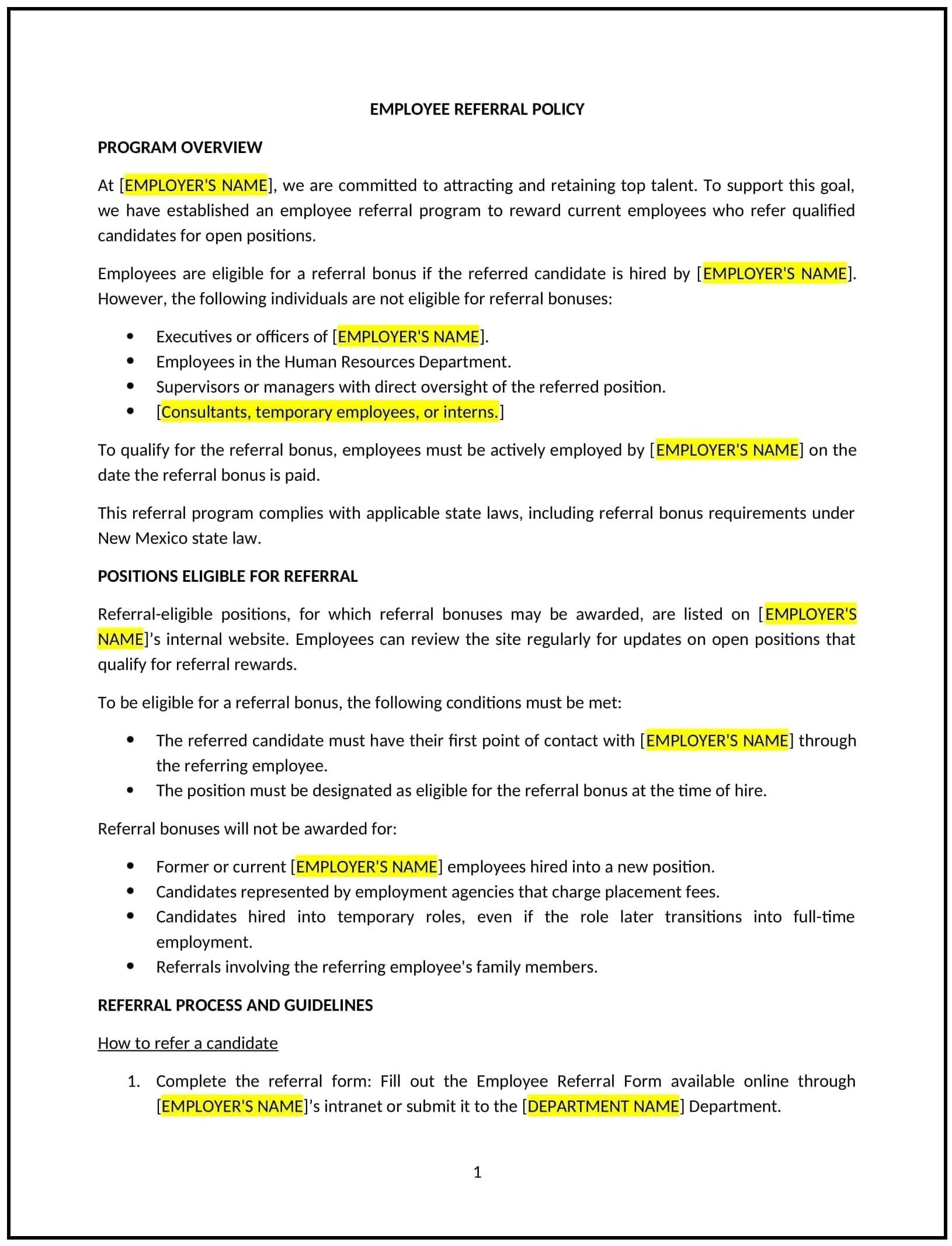Employee referral policy (New Mexico): Free template
Got contracts to review? While you're here for policies, let Cobrief make contract review effortless—start your free review now.

Customize this template for free
Employee referral policy (New Mexico)
This employee referral policy is designed to encourage New Mexico businesses to tap into their existing workforce to identify qualified candidates for open positions. The policy outlines the process for employees to refer candidates, the rewards or incentives for successful referrals, and the expectations for both employees and the company in the referral process.
By adopting this policy, New Mexico businesses can leverage the networks of their employees, reduce recruitment costs, and improve employee engagement through active participation in the hiring process.
How to use this employee referral policy (New Mexico)
- Define the referral process: Clearly outline how employees can refer candidates for open positions, including whether referrals should be submitted through a formal online platform, email, or through HR. Specify what information the employee needs to provide about the referred candidate, such as contact details, resumes, or a brief overview.
- Set eligibility criteria for referrals: Establish guidelines on who can be referred, ensuring that candidates meet the qualifications for the job opening. Clarify whether family members or friends of current employees can be referred or if there are restrictions.
- Determine referral rewards: Specify what rewards or incentives employees will receive for successful referrals, such as monetary bonuses, gift cards, extra time off, or other benefits. Clearly define what constitutes a successful referral, such as when the referred candidate is hired and remains employed for a specified period.
- Address potential conflicts of interest: Set guidelines to ensure that referrals do not create conflicts of interest. For example, the policy may limit the referral of immediate family members or require a review if an employee has a personal relationship with the referred candidate.
- Reflect New Mexico-specific considerations: Include any state-specific labor laws or regulations in New Mexico that might affect referral programs, such as restrictions on certain types of compensation or tax implications for referral bonuses.
Benefits of using this employee referral policy (New Mexico)
Implementing this policy provides New Mexico businesses with several advantages:
- Reduces recruitment costs: Referral programs are often more cost-effective than traditional recruiting methods, as they typically reduce reliance on external recruiters and job advertising.
- Improves candidate quality: Employee referrals tend to result in higher-quality candidates, as current employees are familiar with the job requirements and the company culture, ensuring better alignment with the company’s needs.
- Increases employee engagement: Offering rewards for successful referrals gives employees a sense of involvement in the hiring process, boosting morale and engagement.
- Enhances retention: Referred employees often have a higher retention rate because they have a trusted connection within the company, leading to greater job satisfaction and stability.
- Strengthens company culture: Referring candidates who fit well within the company’s culture can help maintain a positive and cohesive work environment, as employees are more likely to refer individuals who share similar values and work styles.
Tips for using this employee referral policy (New Mexico)
- Communicate the policy clearly: Ensure that all employees are aware of the referral program and understand how to participate. This can be done through employee handbooks, internal emails, or team meetings.
- Track referral success: Set up a system for tracking referrals from submission to hire to ensure that employees are credited for successful referrals and that rewards are provided promptly.
- Offer timely rewards: Provide rewards in a timely manner after the referred candidate has completed the probationary period or other agreed-upon milestone. This helps maintain employee motivation and engagement in the referral program.
- Monitor and improve the program: Regularly evaluate the effectiveness of the employee referral program, including the quality of referrals, the number of successful hires, and employee feedback. Adjust the program as necessary to improve results.
- Ensure fairness: Ensure that the referral process is transparent and fair for all employees. Monitor for any potential abuse of the system and ensure that employees are treated equally when referring candidates.